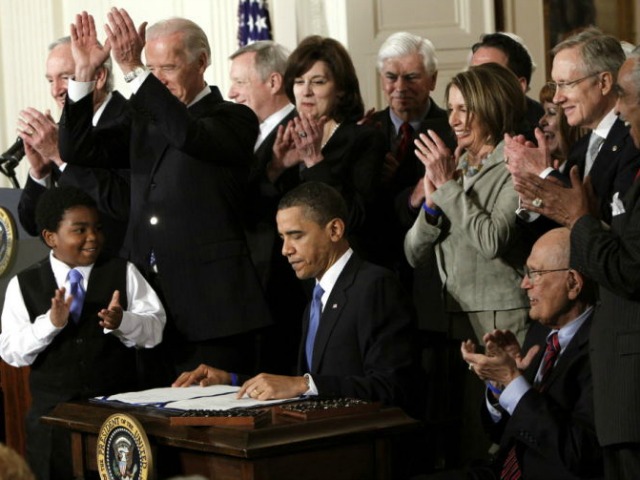
With the White House adding a “hardship exception” to the Affordable Care Act’s individual mandate, the Wall Street Journal argues they are admitting their law is a hardship itself. This puts Democrats in the unenviable position of disowning their own ability to legislate on the eve of the 2014 Congressional midterms.
In a column aptly titled “Obama Repeals Obamacare,” editorial board member Joe Rago argues that Rep. Nancy Pelosi might have included Democrats in her statement that only passing the bill would let us see what is in it. He says now that Democrats can see the devastating results for both Americans and the future of their party, the only way to salvage the law is to prevent most of it from taking effect.
“Preventing the individual mandate from taking effect for individuals whose plan was canceled specifically because of the Affordable Care Act,” he suggests, “implicitly confirm[s] that the law is quarter-baked and harmful” even in the eyes of Democrats. If Obamacare is a hardship itself that warrants an exception for Americans, that makes it little better legally than a natural disaster. That law is what Democrats have to sell voters in the 2014 midterms.
Rago concludes that if Obamacare is the hardship itself, everyone should be eligible for a hardship exception. Democrats will never argue this, of course, but their implicit admission of the dangers of their bill mean “the White House is panicked that the whole entitlement is endangered” and that the ACA could result in more uninsured people than before, rather than a fully insured nation. If Republicans wielded such a devastating statistic, they would stand a real chance of repealing the entire ACA.
Sure, Democrats would continue to argue that such a repeal is “too costly,” but how could it be more costly than a less insured America than the one the ACA was born into? How can Democrats successfully argue that fewer insured Americans is better in the long run than more Americans with health insurance?
The gist of Rago’s argument is that actually passing the Affordable Care Act is the political victory the Democrats sought, regardless of its contents, and they are paying for this flippant attitude today by having to prevent most of its major pillars from taking effect and destroying the lives of millions of Americans. The only way to prevent an outright repeal, Rago concludes, is to prevent the law from doing to Americans what it is designed to do. In this scenario, no deadlines are truly rigid and no mandates can be allowed to fully take effect.
Whether such a tactic will succeed depends heavily on the Republicans successfully arguing that there is no stopping this train constitutionally, only postponing it, without a true repeal. It will also depend on Democrats keeping control of the Senate and potentially winning the House when their signature piece of legislation is so flawed that the White House has deemed it a “hardship.”
The Democrats will, for better or worse, always have certain talking points that executive candidates can return to that sound good in political advertising. They are the party that was in power when Osama Bin Laden was found; they were the party that took troops out of Afghanistan. Anyone with more than superficial knowledge of those situations will see through these veneers, but for an executive, they can be strong viral talking points.
Candidates for Congress have no such resources. In 2014, Democratic Congressional candidates will only have Democrat-championed legislation to direct voters to, and the ACA is their flagship achievement. They have to sell their prowess in writing laws while saddled with a law so harmful that the Obama administration is treating it the way it treats natural disasters. They have to make voters trust them to write bills when they are also frantically trying to prevent provisions of the ACA from taking effect as if they had no idea they put those provisions there in the first place. They have to convince voters that the other party is full of irresponsible lunatics who do outrageous things, like try to prevent the Democrats from passing laws they will later implicitly disavow.
It is a nearly-unprecedented starting point for a midterm election cycle, one easily prevented years ago by more narrowly tailoring a bill proposing such massive industry overhauls. Now, however, it is too late, leaving Democrats stuck picking up the pieces and pushing back against a legislative tidal wave of their own making.

COMMENTS
Please let us know if you're having issues with commenting.